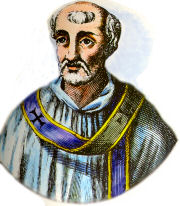Summary: friendship as a means of perfection and evangelizing others.
Full paper is available at: http://www.catholicism.org/downloads/St_Augustine_Friendship.pdf
The title of this paper, “Friends Forever,” is meant to be a little ironic. The expression is one that high school girls tend to write in each others’ yearbooks at graduation. Often times, such friendships, whether or not they are worthy of the name, last not too long after graduation. The only way to make friendships last forever is to base them in Christ, for “No friendship is faithful except in Christ; in Him alone can it be happy and eternal.”
That such friendships do truly last forever is a common opinion of theologians, for one of the “secondary” or “accidental” subjects of the beatitude of the elect is the enjoyment of each other in the Beatific Vision where the concord of the Mystical Body will make us “one heart” with the Sacred Heart of Jesus: “And there will be one Christ loving Himself.”
It was my intention to outline, using the thoughts of St. Augustine, the evangelical and apostolic utility of the bond of friendship, as well as its power to sanctify the individual who extends it. All of us have “friends” of some type or another, even if they are not truly worthy of the name. We can take advantage of these bonds, however tenuous or superficial, for our own advantage, as well as that of our neighbors. We may think we lack the apostolic advantages of the North American Martyrs, but what we really lack (besides, perhaps, their sanctity) are their numerous disadvantages. One advantage we have over them is that, in our “mission territory,” we are already known and have established a rapport with the natives.
In order to use friendships for such a holy end, the soul of the individual must be steeped in supernatural virtue, which implies the living of a devout life: frequently receiving the sacraments, praying, practicing the moral virtues, the theological virtues, and sailing on the breath of the Holy Ghost by utilizing His seven-fold gifts. This supernatural panoply begins with, and depends upon Faith, that virtue which is the initium salutis, the beginning of salvation, for “A man must be a friend of truth before he can be a friend to any human being.” Thus we see that the interior life, a good in itself (bonum honestum), is also a useful good (bonum utile) for the purposes of evangelism.
By failing to live the life of virtue, which even the pagan Cicero recognized as necessary for this union, those friendships we have may become easily corrupted and an occasion for our own damnation. We must heed the caveat of our guide and teacher, all too familiar as he was with the vices occasioned by bad friendships: “The bond of human friendship has a sweetness of its own, binding many souls together as one. Yet because of these values, sin is committed, because we have an inordinate preference for these goods of a lower order and neglect the better and the higher good.” For friendship inevitably unites us to our friends “and of many [makes] us one,” and of close friends it can be said that they are “two in body but one in mind,” so we must choose our friendships wisely and terminate them when they become a danger, while never ceasing to pray for and exhort our former friends, as our Master did for Julian and Boniface.
In order to make these friendships become holy and advantageous to all concerned, we must recall the necessity of grace, and the consequent necessity of prayer, which is a duty of Christian friendship: “for there is no true friendship save between those thou dost bind together and who cleave to thee by that love which is ‘shed abroad in our hearts through the Holy Spirit who is given to us.’”
Friends Forever
In this life, friendships are uncertain. Augustine’s own sad experience with Julian of Eclanum and others taught him that hidden treacheries, instability, and other vices always threaten friendships and make us, frail creatures as we are, ever vulnerable: “How confused it all is! One who seems to be an enemy turns out to be a friend and those whom we thought our good friends in fact are our worst enemies.”
Only heaven, with its uninterrupted, ecstatic union with our Final End can give men the constancy they need to be “friends forever”:
“Blessed is he who loves his friend in Thee... for he alone loses none dear to him, to whom all are dear in Him who cannot be lost.”


